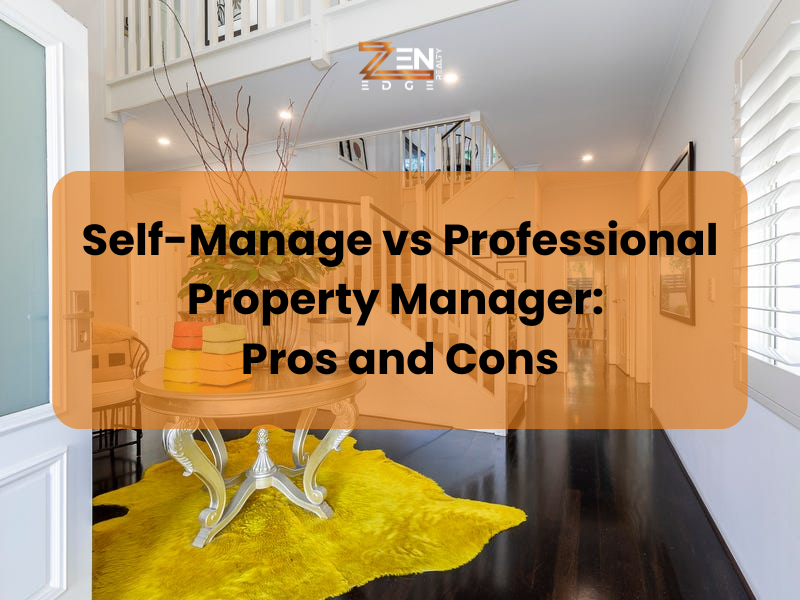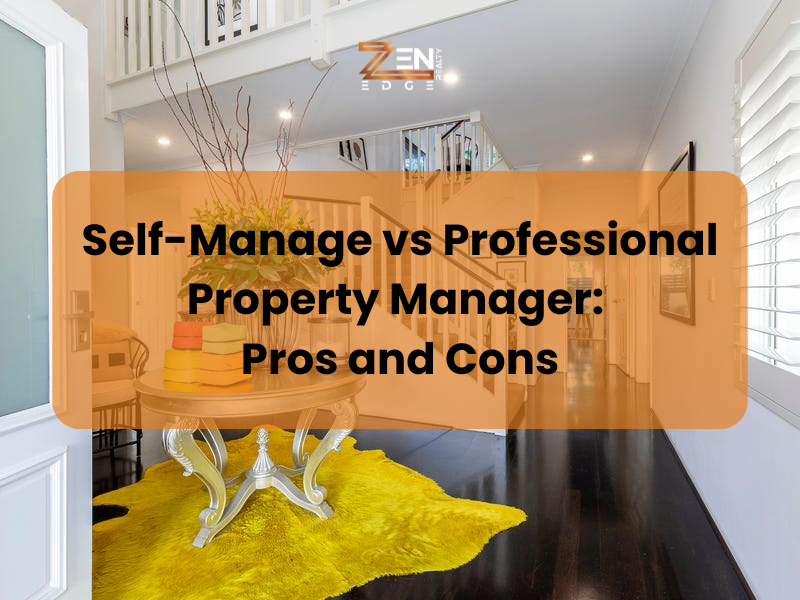When deciding whether to self-manage your rental property or hire a professional property manager, it’s important to weigh the pros and cons of each option. This guide will help you understand the benefits and challenges of both approaches to make an informed decision.

Self-Management
Pros:
- Cost Savings: By managing the property yourself, you avoid paying management fees, which can range from 7% to 10% of the monthly rental income.
- Direct Control: You have complete control over all aspects of property management, from tenant selection to maintenance decisions.
- Personal Touch: You can build a direct relationship with your tenants, which can lead to better communication and satisfaction.
- Immediate Response: As the landlord, you can respond quickly to issues without the need to go through a third party.
Cons:
- Time-Consuming: Managing a property can be time-intensive, especially if you have multiple properties or demanding tenants.
- Lack of Expertise: You may not have the same level of knowledge and experience as a professional property manager, which can lead to mistakes or oversights.
- Legal Compliance: Staying updated on local laws and regulations requires continuous effort. Failure to comply can result in legal issues.
- Stress and Pressure: Handling tenant disputes, maintenance emergencies, and rent collection can be stressful.
Professional Property Management
Pros:
- Expertise and Experience: Professional property managers have extensive knowledge of the rental market, legal requirements, and best practices.
- Time Savings: They handle all aspects of property management, freeing up your time for other pursuits or investments.
- Efficient Tenant Screening: Property managers use rigorous screening processes to find reliable and responsible tenants.
- Maintenance Management: They have established relationships with contractors and can handle maintenance and repairs efficiently.
- Legal Compliance: Property managers stay updated on laws and regulations, ensuring your property complies with all legal requirements.
- Reduced Stress: They handle tenant communications, disputes, and emergencies, reducing your stress and involvement.
Cons:
- Cost: Property management services come with fees, typically a percentage of the monthly rental income, which can impact your overall profit.
- Less Control: You have less direct control over the day-to-day operations and decisions related to your property.
- Potential for Poor Service: Not all property managers are equally competent. It’s crucial to choose a reputable and experienced company to avoid issues.
- Communication Barriers: Adding a middleman can sometimes lead to communication delays or misunderstandings between you and your tenants.
Financial Considerations
When weighing the financial aspects of self-management versus hiring a professional property manager, it’s essential to consider both direct and indirect costs. Self-managing saves on management fees, which can significantly impact your net rental income. However, this saving must be balanced against potential costs arising from vacancies, maintenance mishaps, or legal issues due to inexperience. Conversely, while professional managers charge fees, their expertise can lead to fewer vacancies, higher rental rates, and more efficient maintenance, which can enhance overall profitability.
Tenant Relations
Effective tenant management is crucial for long-term success. Self-managing landlords have the advantage of establishing direct, personal relationships with tenants, fostering a sense of trust and community. This can lead to higher tenant satisfaction and longer lease terms. However, this personal involvement can also become emotionally taxing, especially during disputes or evictions. Professional property managers, on the other hand, act as intermediaries, maintaining a professional distance that can facilitate more objective decision-making and conflict resolution, but potentially at the cost of a personal touch.
Scalability and Growth
For landlords looking to expand their property portfolios, scalability is a key consideration. Self-managing a single property might be feasible, but managing multiple properties can quickly become overwhelming. Professional property managers are equipped to handle larger portfolios, offering consistent and scalable solutions for managing multiple properties. Their systems and processes allow for efficient management across various locations, enabling landlords to grow their investments without being bogged down by day-to-day management tasks.
Technological Advantages
Modern property management involves various technologies, from online rent payment systems to maintenance tracking and tenant communication platforms. Professional property managers typically have access to advanced property management software, providing streamlined operations and enhanced tenant experiences. Self-managing landlords may struggle to implement and manage these technologies effectively. Investing in the right technology can be costly and time-consuming, but it is increasingly necessary to meet tenant expectations and maintain competitiveness in the market.
Risk Management
Managing a rental property inherently involves risks, from tenant damage to legal disputes and compliance issues. Professional property managers are well-versed in risk management strategies, including thorough tenant screening, regular property inspections, and ensuring legal compliance. They can provide valuable advice on insurance and other protective measures. For self-managing landlords, mitigating these risks requires significant effort and knowledge. Mistakes in these areas can lead to costly repairs, legal battles, or even financial ruin. Professional managers can help shield landlords from these risks, providing peace of mind and safeguarding the investment.
Discover the ZenEdge Realty advantage! Get an expert appraisal, confidently sell, and find your dream home with us. Get an Appraisal, Buy, or Sell with the Experts! Visit www.zenedgerealty.com.au.
Conclusion
Choosing between self-managing your rental property and hiring a professional property manager depends on your personal circumstances, expertise, and preferences. If you have the time, knowledge, and desire to manage your property yourself, self-management can be a cost-effective option that gives you direct control. However, if you prefer to minimise stress, save time, and leverage professional expertise, hiring a property manager may be the better choice.
Consider your goals, available resources, and the specific demands of your property before making a decision. Regardless of which option you choose, staying informed and proactive will help you manage your rental property successfully.

Leave a Reply